Business in Mali, Bamako, Mining, Gold

Mali: third African gold producer. Malian Economy and Foreign Trade
- Introduction to the Republic of Mali (West Africa)
- Ahmadou Hampaté Bá (Malian Historian): “In Africa, when an old man dies; it is a library burning”
- Malian Economy
- International Trade of Mali
- Business and Investment Opportunities in Mali:
- Agribusiness
- Livestock
- Malian Mining sector
- Renewable Energy
- Tourism
- Case Study: Desert Gold Ventures (Canada) in Mali
- Investment Promotion Agency of Mali
- Access to the Malian Market
- Business Plan for Mali
The objectives of the subject “International Trade and Business in Mali” are the following:
- To analyze the Malian Economy and Global Trade
- To know the trade opportunities in Mali
- To explore the Malian trade relations with the country of the student
- To know the Malian Trade Agreements
- To develop a business plan for the Malian Market

The Subject “Foreign Trade and Business in Mali” belongs to the following Online Programs taught by EENI Global Business School:
Doctorate in African Business, Islamic Business, World Trade.
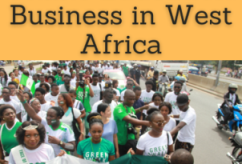
Master in Business in Africa, International Business.
- Credits of the subject “Doing Business in Mali”: 1

- Duration: one week

Mali: The third gold producer in Africa.



Malian Trade Agreements and Preferential Access:
- Mali and the West African Economic Area
- Economic Community of West African States (ECOWAS)
- West African Economic and Monetary Union (WAEMU)
- Community of Sahel-Saharan States (CEN-SAD)
- African Continental Free-Trade Area
- The U.S.-Mali
- Mali is the beneficiary of the AGOA
- US-UEMOA Agreement
- EU-Mali
- Africa-EU Partnership
- EU-Generalized System of Preferences (GSP)
- Islamic Trade Preferential System
- G5-Sahel
- Organization for the Development of the Senegal River
- Niger Basin Authority
- OHADA
- Arab Bank for Africa (BADEA)

- WTO
- GATS
- Agreement on Sanitary Measures
- Agreement on Technical Barriers to Trade
- Agreement on Preshipment Inspection
- Agreement on Safeguards
- Trade Facilitation Agreement
- WCO
- Kyoto Convention
- BIC
- Chicago Convention (ICAO)
- IMO
- Convention for Safe Containers
- Istanbul Convention
- Rotterdam Rules
- Customs Convention on Containers - not a member

- Economic Commission for Africa
- African Union
- AU Convention on Preventing and Combating Corruption
- AUDA-NEPAD
- Africa Agriculture Development Programme
- African Development Bank
- Africa-Asia Partnership
- Africa-Korea Partnership
- Africa-BRICS
- Africa-Turkey Partnership

- Afro-Arab Cooperation
- BADEA
- Islamic Development Bank
- OIC

- UN
- WB
- WTO
- IMF
Sample: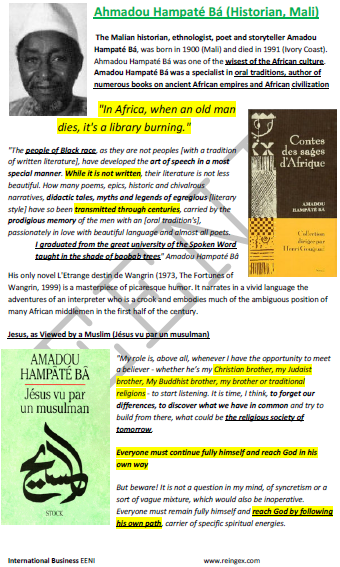
The Republic of Mali (landlocked country) is the largest country in West Africa after Niger.
- Mali shares borders with Mauritania, Algeria, Niger, Burkina Faso, Ivory Coast, Guinea, and Senegal
- Malian Population: 18 million people (50% women)
- Malian Area: 1,241,238 km²
- Bamako is the capital of the Republic of Mali (1.8 million people)
- The largest Malian cities are Bamako, Gao, Kayes, Kidal, Koulikoro, Mopti, Ségou, Sikasso, and Timbuktu
- Official language of Mali: French
- 50% of Malian speak Bambara
- Independence of Mali: 1960 (France)
More information about Mali (EENI African Business Portal).
Main religions in Mali:
- Islam (94% of the Malian population)
- African Traditional Religions

Mali belongs to the West African Economic Area.
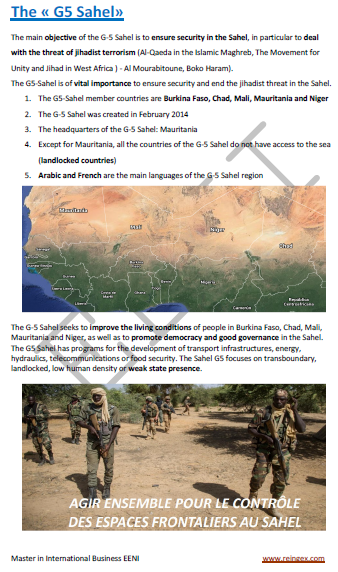

Malian Economy:
- The main Malian economic activity are agriculture and livestock (44% of Malian GDP; 80% of the working population)
- Malian GDP growth: 5%. Recession in 2012
- Inflation in Mali: 2.1%
- Mali is the third largest gold producer in Africa (75% of the total exports)
- Malian Cotton: 15% of the total exports
- Strong liberalization policy
- Political instability risks in North of Mali: Tuareg rebels (National Movement for the Liberation of Azawad) and Islamist armed groups
- Malian currency: CFA Franc
- Bamako (Mali) - Dakar (Senegal) Rail transport: 1,248 km
Global Trade and Business in Mali
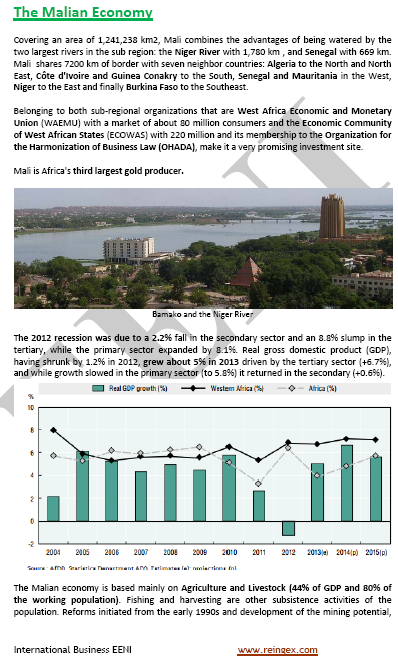
Alphadi, “The Prince of the Desert.” Child of Tuareg, Seidnaly Sidhamed alias ALPHADI was born in 1957 in Timbuktu (Mali), they parents were traders. In Niger; he lives surrounded by his eight brothers and sisters. Very early; he enjoys disguise her sisters and mother and spends hours in front of Hindus films to observe the make-up of the actresses. It is already very sensitive to anything that might improve the female beauty. However, in a Muslim country, fashion is a sector banned to boys. Alphadi flies to success. There is not a corner in the World where he had to organize a parade: Niamey, Abidjan, Paris, Brussels, New York, Washington, Quebec, and Tokyo.
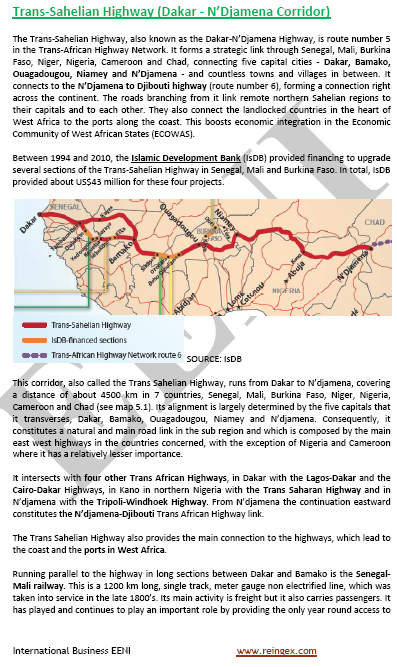
(c) EENI Global Business School (1995-2024)
We do not use cookies
Top of this page




 or
or 

